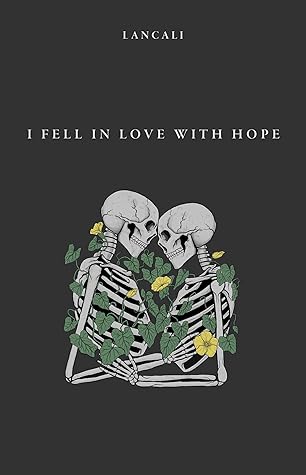More on this book
Community
Kindle Notes & Highlights
Being sick teaches you that reasons are just poor attempts at justifying misfortune.
Futures are never certain. Nothing will teach you that better than watching someone you love walk away.
This is ritualistic too. A moment of silence for half a pair of lungs and half a heart.
“Try walking away from someone who knows you so well they ruin you.
Injustice or tragedy, my friends are going to die.
Your eyes adjust, your hands become used to not being kissed, and your heart settles in the numb.
People feel awkward around the sick, so they pretend the sickness is invisible. They avoid the elephant in the room so blatantly that you can tell it’s all they’re thinking about. They create distance without even meaning to because distance is comfortable.
He hasn’t bothered to pick up the pieces. He knows his heart will only shatter again if he does.
Neo’s father either doesn’t notice or doesn’t care about the pain whimpering through Neo’s lips when I lay that tray down. He stares at him, not with hate or anything so grotesque. He looks at Neo with expectation, a nod of encouragement his final say.
“He loves me because he has to,” Neo cries. “That’s worse than hating someone.
Love gives people the power to be treacherous.
Hate is a choice. Love is not.
“Stars aren’t eternal. They should burn and shine with everything they have while they can,”
I asked if it was ironic that we call fallen angels devils.
We don’t have diseases. They have us.
Sony’s mother was one of those people who would give anything just to see her child happy. Not in her expectations, not in a vicarious future, but wearing her own joy, climbing her own mountains. It’s a rarer thing to find in parents than you may think.
Reasons are illusions. Their absence is common.
death isn’t playful. Death is sudden. It has no taste for irony or reason. It doesn’t wait for another tick of the metronome. It doesn’t wait for goodbyes. Death is a taker, plain, direct, no tricks up its sleeve.
People who don’t believe one could be so numb that even their disease doesn’t hurt enough. “You’re depressed,”
The moment someone realizes you’re going to die, they will not treat you the same way as if you were going to live.
It doesn’t hurt. Pain and I have a reasonable agreement. Pain is jealous. As long as I don’t feel anything else, it’s content staying at bay.
Heaven is a perfect place. Perfection isn’t real. A perfect place in death sounds a lot like something to bait you into behaving. Or into dying. Behaving and dying are poor endings for thieves.”
“He wrote once that ‘clothes are a strange and clever hiding place. Bruises, scars, insecurities—we hide them all if we choose to, the essential parts of us kept only for the gazes of mirrors and lovers.’ ”
“Mostly, I think it’s about an annoying narcissist who’s obsessed with death till it actually knocks on his door, but—”
His grades probably don’t matter because of his star athlete gig. Girls practically cling to him in the halls like popularity leeches. His taste in friends is just impeccable too. I should know. They beat me up while he watched.”
He doesn’t push past his mother, trembling with rage, and she is the greatest bystander in his life. There’s something else I’m missing between the lines.
Whatever he’s thinking, it isn’t said aloud. When someone talks to him, only half his attention is on the words. The other half is lost, glazed over behind his eyes. I don’t think it’s intentional ignorance.
“I’m such a coward.” The proclamation sounds comfortable coming from his mouth, as if he’s said that before.
“It’s not always easy to do the right thing,” I say. More souls than those lost to this place taught me that. “If you can look back and see the mistake you made, you’re not a coward.”
Neo says it wasn’t till the whole school found out he was sick that teachers finally decided to speak up, and the population of his attackers thinned.
“You dangle futures that don’t exist in front of them like bait. You’re making their pain inevitable.”
We eat together, me in silence, him telling me his fairy tales. They’re grand stories, ones with neat endings and no loose ends to tie. I ask him why stories in real life don’t end that way.
We are aimless, but aimless adventures become the greatest stories.
As if identity should be rewritten to the whims of others. A thing to be solved rather than nurtured.


